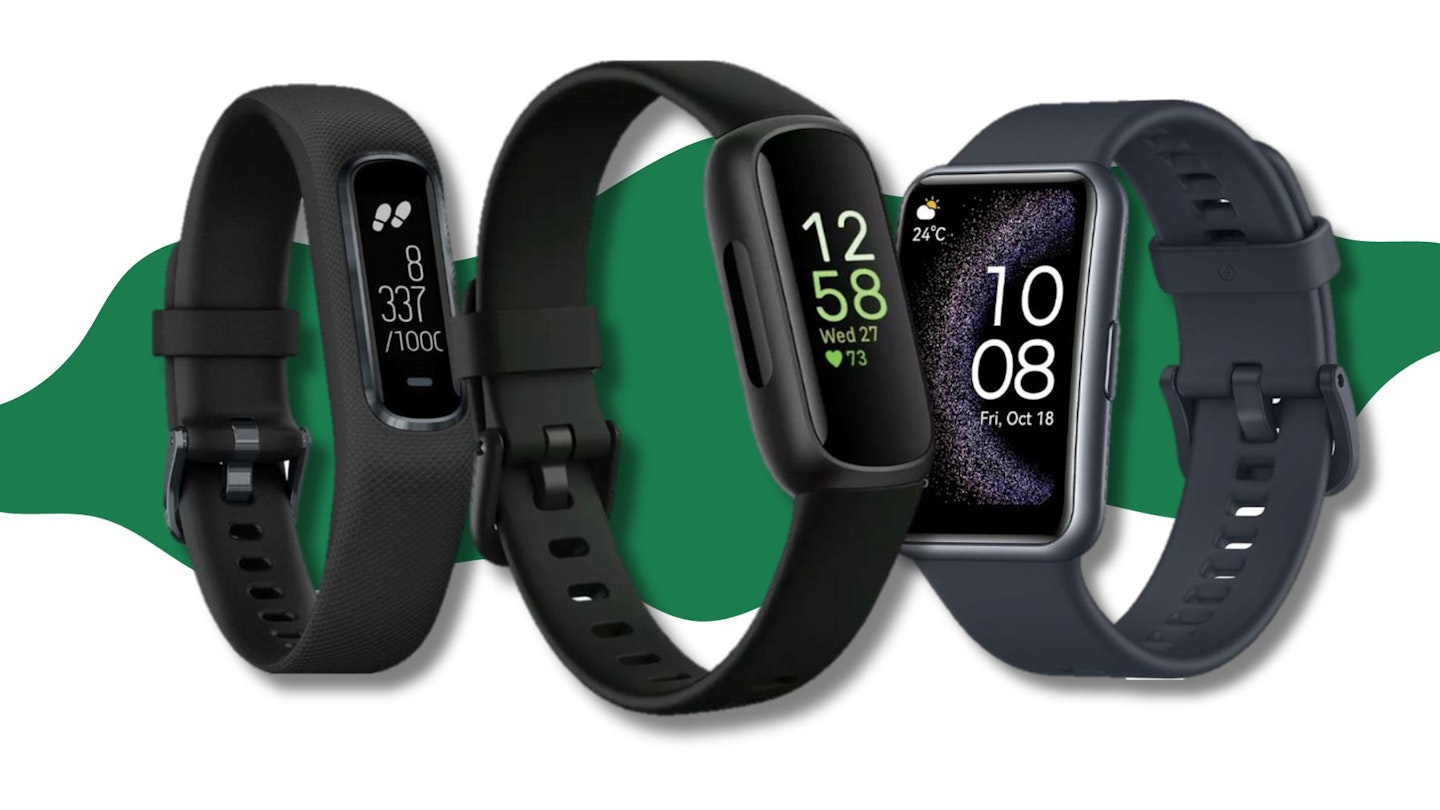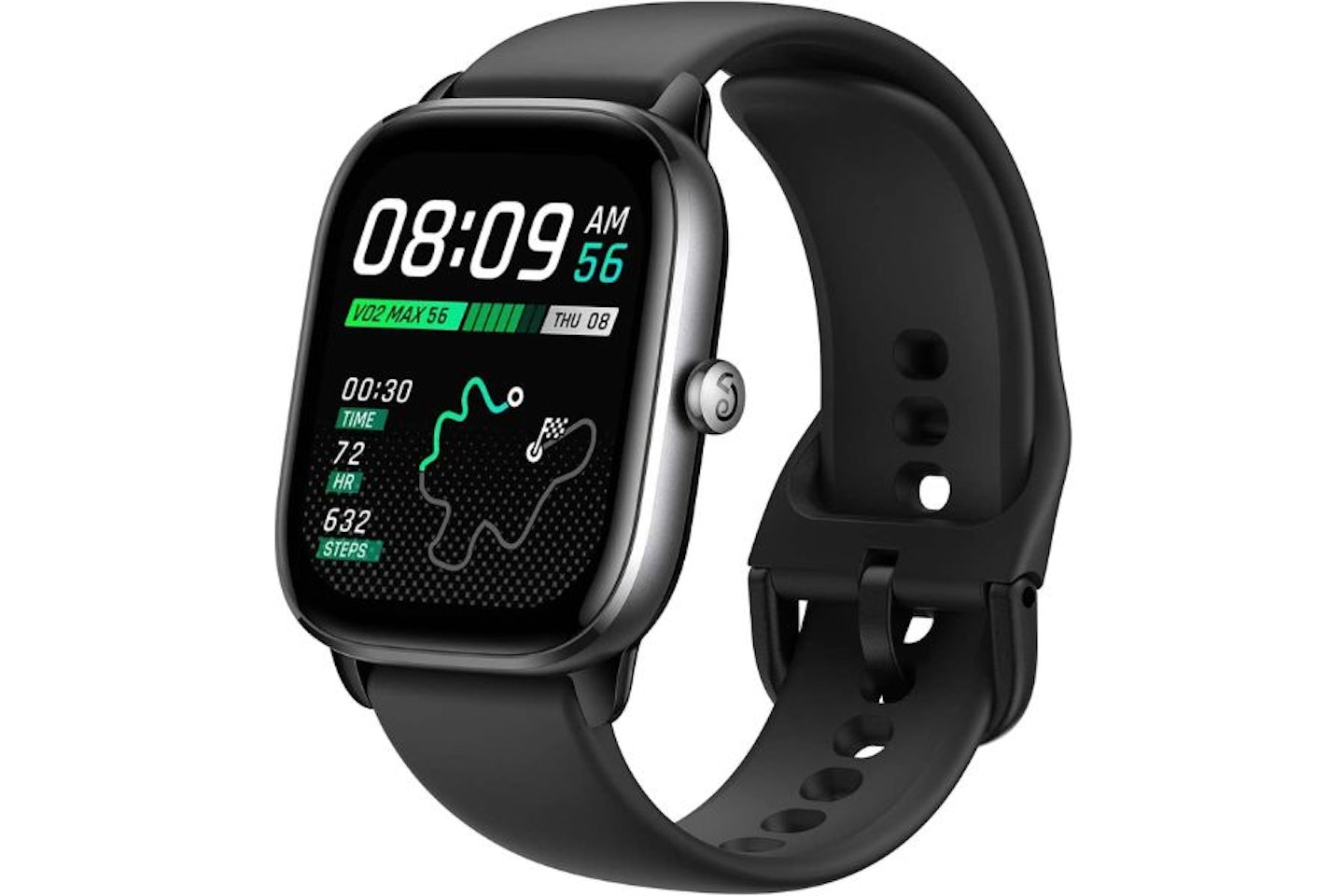The best fitness trackers under £100 are an affordable way to keep track of your health and fitness goals. While there are plenty of smartwatches and fitness trackers that cost considerably more, there's still plenty of choice towards the lower end of the price spectrum. And the best part is that spending less doesn’t automatically mean you are missing out on the essential metrics you’d expect to find in one of the best fitness trackers.
Pricier devices, such as one of the best running watches, may offer more overall. However, they’ll often include features that are really aimed at specific goals, such as training for a 10k. A good quality fitness tracker – even at a more affordable price – still offers lots of health and fitness tracking metrics to help you get into shape. They’re perfect for anyone who wants to keep track of fundamentals such as their step count or heart rate, or just to give them an extra nudge towards healthier habits. Whatever your goal, there’s almost certainly a suitable fitness tracker for under £100.
Best fitness trackers under £100 at a glance:
Early fitness trackers struggled to do much more than count your steps. The sub-£100 price bracket now has a wide range of surprisingly sophisticated devices offering plenty to anyone who wants to keep an eye on their spending as well as their fitness.
Whether you want to monitor the basics of step counts and calorie burn, or you need something that can accurately track your runs and bike rides, there’s something to support you on your journey.
The best fitness trackers under £100
Please note: All prices are correct at the time of writing. Prices, stock and deals are subject to change without notice.
Best overall
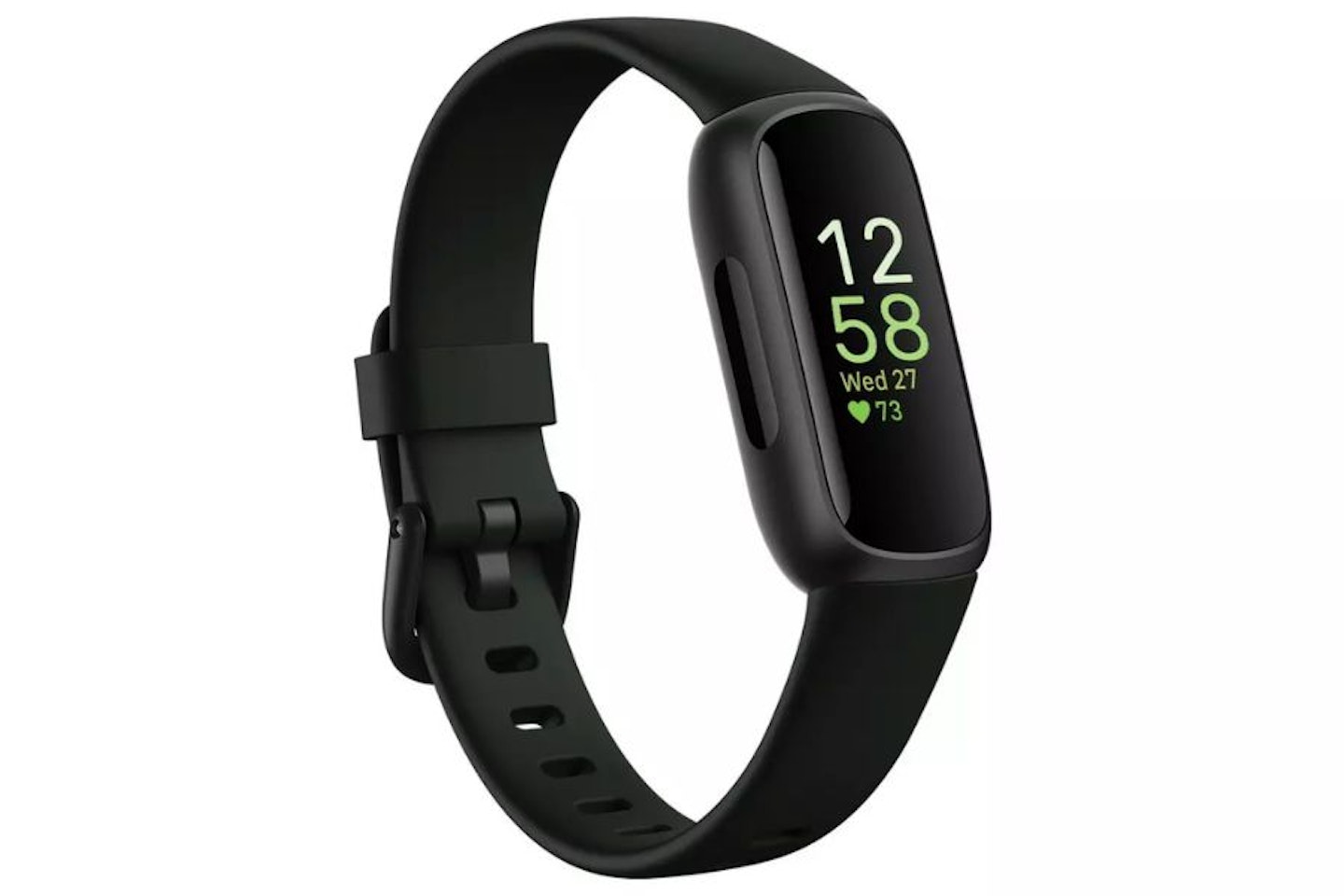 Argos
ArgosThe Fitbit Inspire 3 happens to be one the best Fitbits overall, as well as one of the best fitness trackers under £100 – and with good reason. Fitbit is a leading brand in the world of health and fitness tracking, with years of research and development behind it. The Inspire 3 is one of the smallest and most affordable of their devices, and yet it still offers an impressive list of features. These include heart rate, sleep, step and blood oxygen monitoring, and estimated calorie burn.
The Fitbit app is extremely user friendly, and gives access to detailed insights into overall health and fitness, and any trends over time. The app is essential to help get the most out of your Fitbit. It isn’t as advanced as some of Fitbit’s more expensive models, but its 10-day battery life is better than most Fitbits and holds its own against most other fitness trackers as well. It’s a polished device that doesn’t cost a fortune.
Pros
- Daily scores that show how ready you are to exercise or how well you're managing stress for real-time tracking
- Water resistant up to 50 metres, so you can wear it while swimming and beyond
- Strap can be removed and replaced for ultimate customisation
Cons
- Some premium features require additional payment
| Display: | 17.78mm, AMOLED |
| Sensors: | accelerometer, optical heart rate monitor, red and infrared sensors for blood oxygen monitoring, vibration motor, ambient light sensor |
| Battery life: | 10 days |
| GPS: | Connected-GPS |
| Workouts tracked: | More than 20 exercise modes |
| Weight: | 17.69 grams |
| Dimensions: | 39.32mm l x 18.6mm w x 11.75mm h |
Best budget
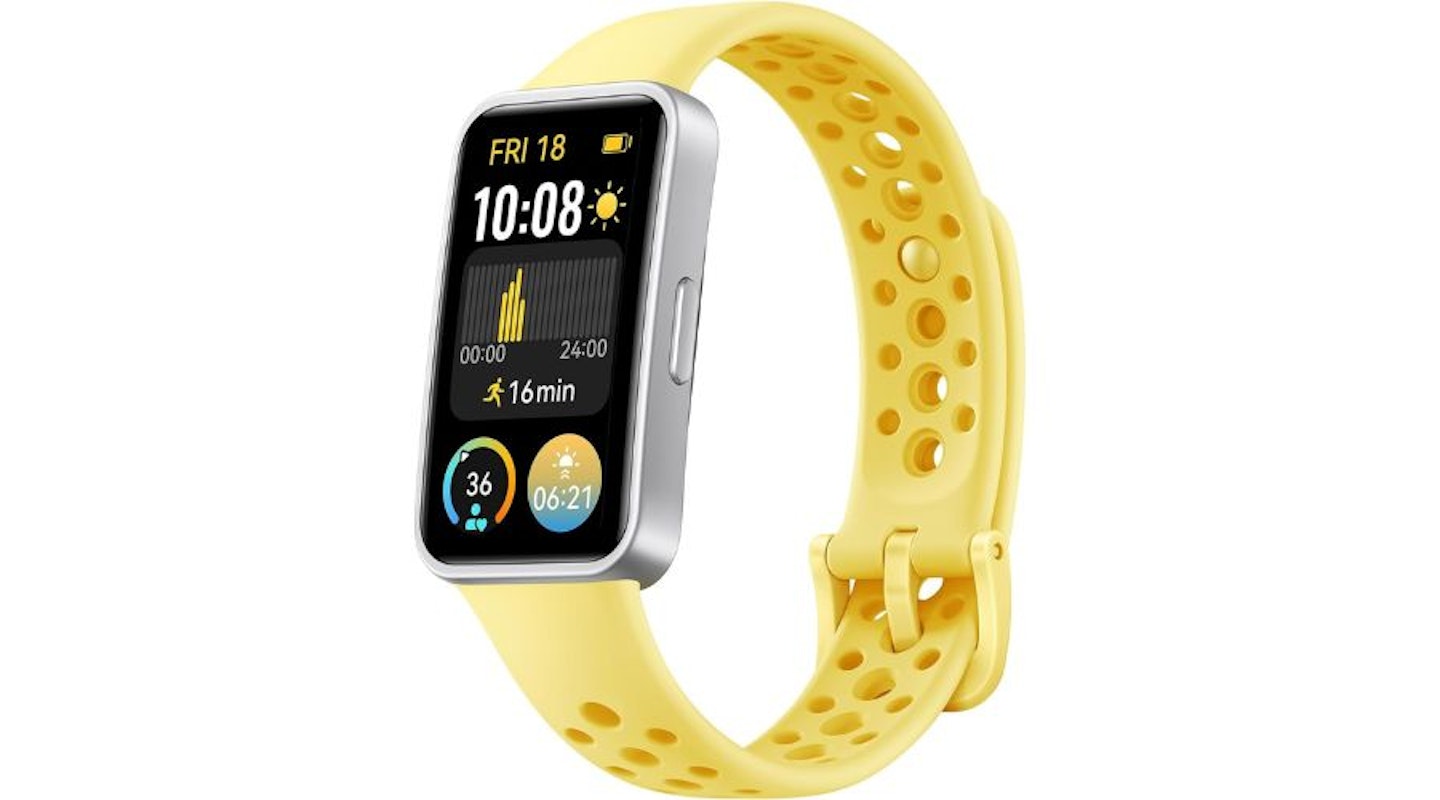 Amazon
AmazonThe Huawei Band 9 packs a punch, despite being incredibly affordable. In return for an RRP of £49.99 you’re getting a vibrant, 1.47-inch OLED screen, that still somehow manages to weigh just 14g. And in terms of its health and fitness tracking, there isn’t much missing either.
Features include sleep tracking, heart rate and blood oxygen measurements, stress, and women’s health tracking including period reminders and fertility window predictions.
It can also track over 100 different activity types, and its 5ATM water resistance makes it safe to take swimming. It also claims to be able to monitor your stroke count, stroke rate, and SWOLF (which measures your swimming efficiency) while you’re in the water.
The app is there to collate all the data and provide regular insights into your health and wellbeing. There are some potential concerns about its accuracy, but if you want something inexpensive that covers almost everything you could want in a fitness tracker, it’s a great option.
Pros
- Two-week battery life is excellent, and charging is fast
- Swim tracking is rare at this price point
- Improved sensors make it more accurate than previous models
Cons
- Not the most user-friendly
| Display: | 1.47-inches, AMOLED |
| Sensors: | 9-axis IMU sensor (Accelerometer sensor, Gyroscope sensor, Magnetometer sensor), Optical heart rate sensor, Ambient light sensor |
| Battery life: | 14 days |
| GPS: | Connected-GPS |
| Workouts Tracked: | 100 workout modes |
| Weight: | 14g (without straps) |
| Dimensions: | 43.45 × 24.86 × 8.99 mm |
Best with GPS
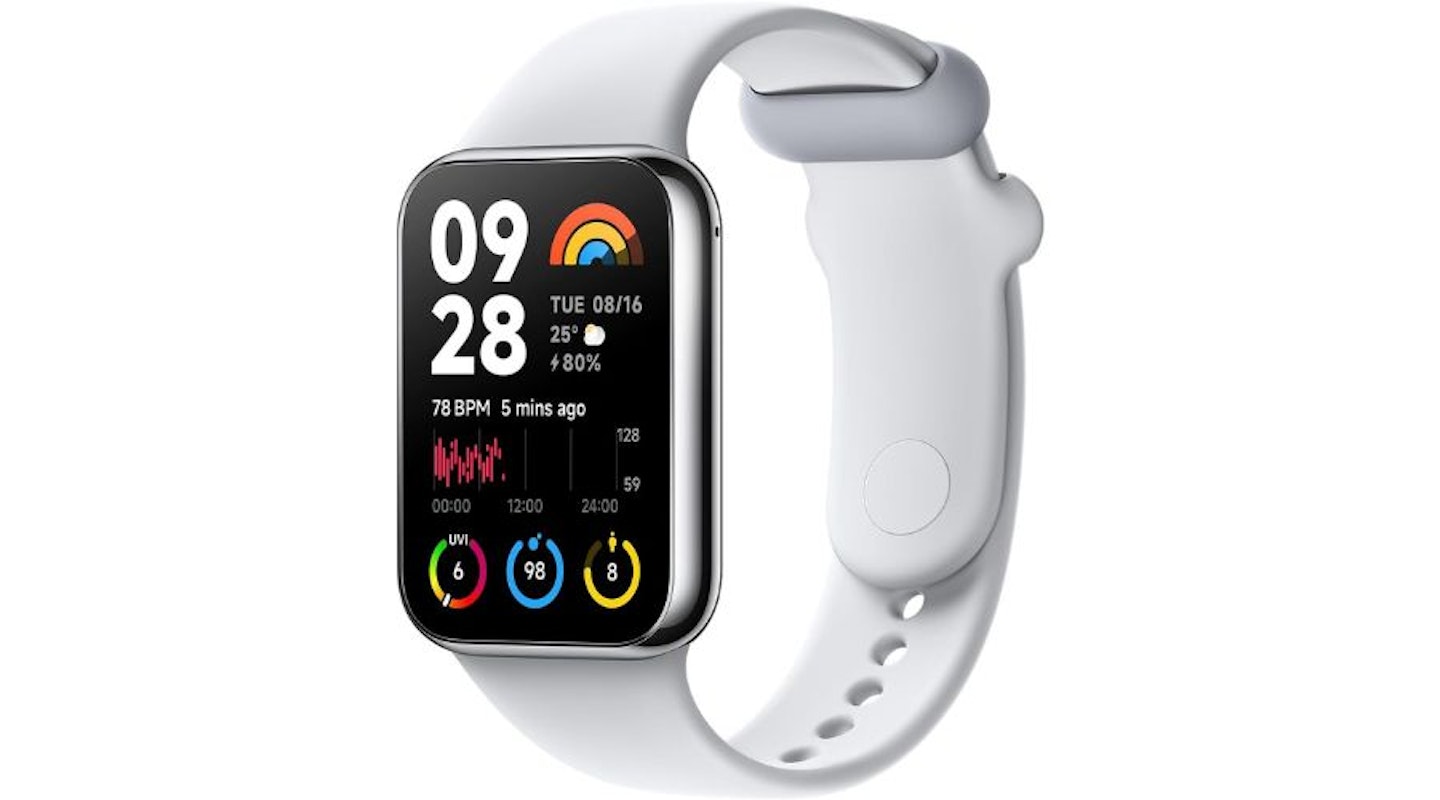 Amazon
AmazonXiaomi’s Smart Band 8 Pro is a device that looks more like a smartwatch than a traditional fitness tracker. And while it may lack many of the features of a "true" smartwatch (such as apps) one feature that really makes this device stand out is built-in GPS. Most budget fitness trackers rely on connecting to your phone’s GPS. But this device has its own GPS connection, which allows you to leave your mobile behind when you’re off for a run or a bike ride.
In addition, the Band 8 Pro will track your heart rate, blood oxygen, sleep, step counts, and calorie burn. There are also advanced training metrics such as VO2 Max, training effect and recovery time, and cadence and stride length when running. The large AMOLED screen is bright and easy to read, and you’ll get around six days between charges.
Pros
- Built-in GPS for accurate location tracking
- Excellent battery life
- Superb screen
Cons
- The Mi Fitness app isn't the best
| Display: | 1.74-inch, AMOLED |
| Sensors: | Accelerometer, gyroscope, optical heart rate and pulse oximeter, ambient light sensor |
| Battery life: | 7 days |
| GPS: | Built-in GPS |
| Workouts tracked: | Over 150 sports modes |
| Weight: | 22.5 grams (without strap) |
| Dimensions: | 46 x 33.35 x 9.99mm |
Best display
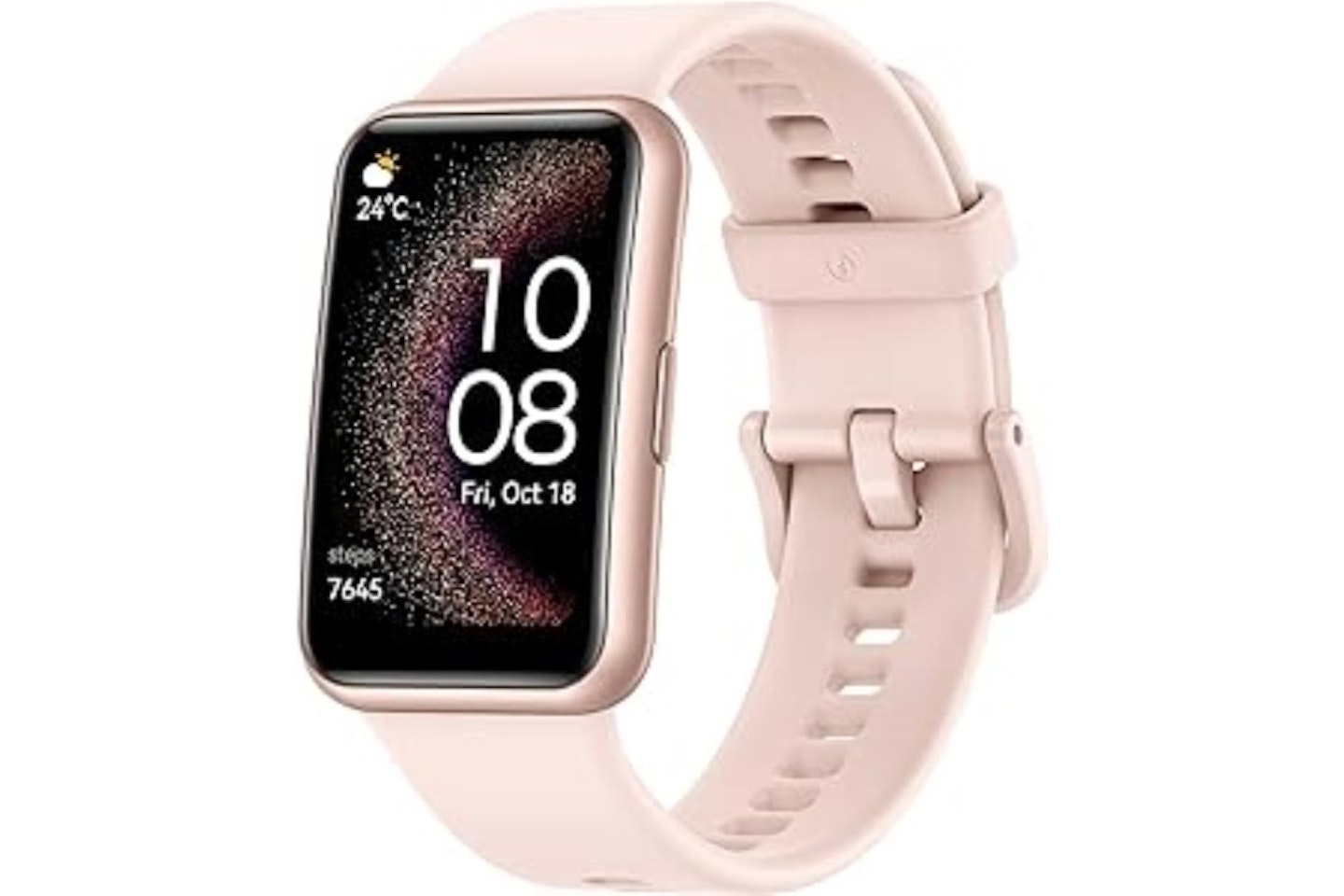
With a 1.64-inch HD AMOLED display, the Huawei Watch Fit SE has one of the largest displays of any device on this list. It also offers a wide array (over 10,000) of watch faces to choose from. But it's more than just a pretty face.
The Watch Fit SE tracks sleep, heart rate, blood oxygen, steps and estimates calorie burn. It also has over 100 workout modes for tracking your exercise, and a "scientific" running program that monitors metrics such as VO2 Max, training load, recovery time, and running ability. It also has built-in GPS, to deliver accurate tracking of outdoor activities.
There are also features such as weather reports, a stopwatch, music controls, and even a torch function. And despite the large screen, the battery will still give you somewhere between six and nine days of usage between charges. It's a well-stocked device, and still manages to come in at £89.99 (RRP), which is very competitive given all it has to offer.
Pros
- Convenient display screen with different watch faces available for the ultimate personalisation
- Huawei have improved sleep accuracy by 10% on this model, so you can easily keep an eye on your sleep score and metrics
- Huawei TruSport provides data on your training load and VO2Max data, making your progress visible
Cons
- Some reviewers are finding the wireless range isn't great, and it's easily disconnected from your phone
| Display: | 1.64 inch, AMOLED |
| Sensors: | 6-axis IMU sensor (Accelerometer sensor, Gyroscope sensor), Optical heart rate sensor |
| Battery life: | Up to 9 days |
| GPS: | Built-in GPS |
| Workouts tracked: | Over 100 sports modes |
| Weight: | 21 grams (without strap) |
| Dimensions: | 46 mm × 30 mm × 10.7 mm |
Best for battery life
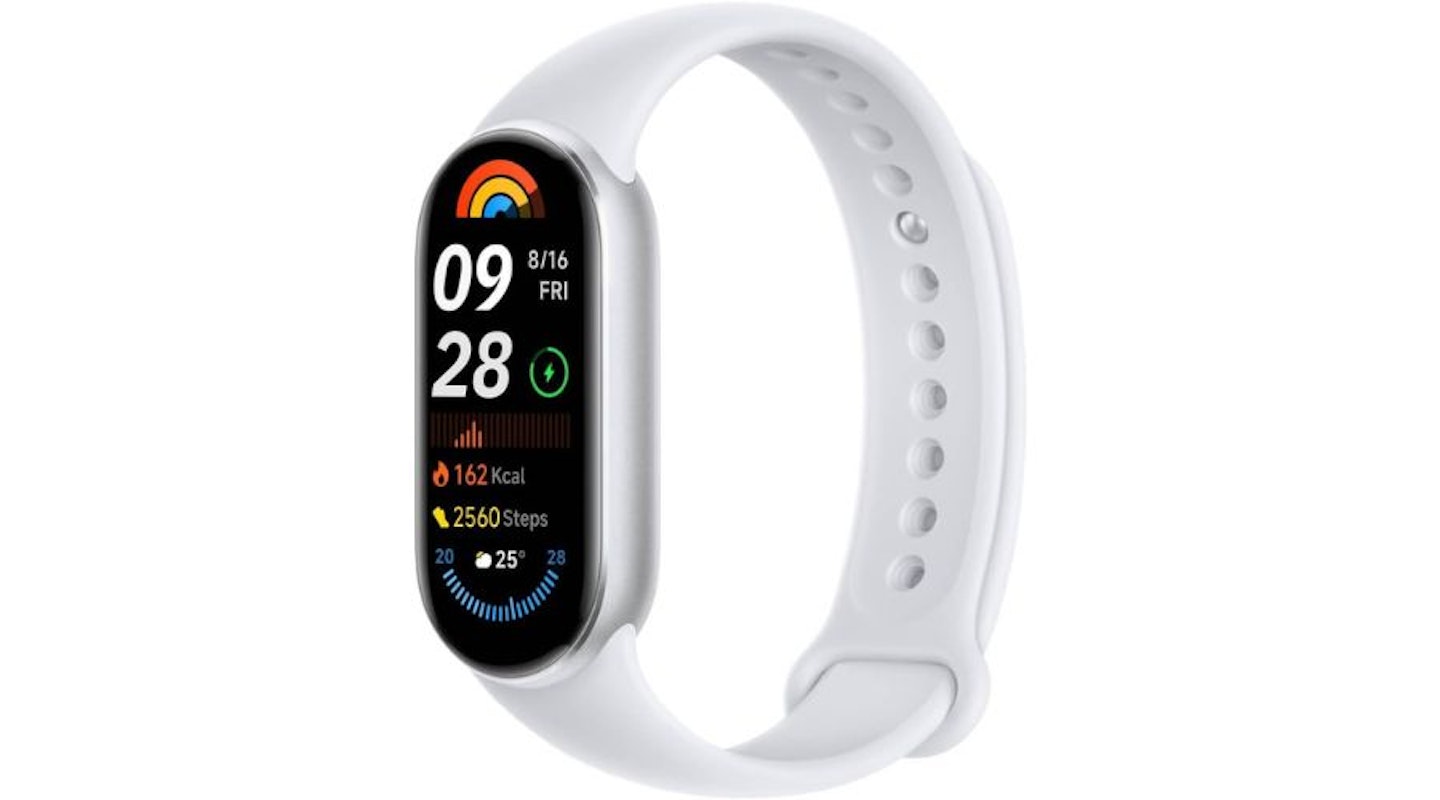 OnBuy
OnBuyFitness tracker battery life can be variable, but typically you should expect at least five days between charges. The Xiaomi Band 9 offers a whopping 21 days. This will vary slightly depending on how heavy your usage is, but overall, there aren’t many fitness trackers that can compete – especially at this price.
You’ll still get heart rate, blood oxygen, sleep and stress tracking, training metrics like VO2 Max, recovery time, training load and training effect, menstrual cycle tracking, and around 150 sports that can be tracked. You’ll also get a large, 1.62-inch AMOLED display that’s twice as bright as the Band 8 this model replaces, and easy to read.
There’s also something called Pebble Mode. This allows you to remove the tracker from its strap and put it on your show via an attachment (sold separately) and use it as a running pod. If you're a keen runner, this feature may be particularly appealing.
There are some compromises to be made – it isn’t the most accurate device on the market (although Xiaomi claims that new sensors mean this has improved by up to 16 per cent), and it doesn’t have the most polished app. But if you just want to track the basics without worrying about charging it all the time, the Xiaomi Band 9 could be the perfect choice, especially given its competitive RRP of £34.99.
Pros
- Pebble Mode is an exciting addition for runners
- Battery life is extremely good
- Vast selection of exercise types can be tracked
Cons
- Tracking accuracy isn't the best
| Display: | 1.62-inch AMOLED, 192 x 490 pixels |
| Sensors: | High precision 6-axis sensor, PPG heart rate sensor, Ambient light sensor |
| Battery life: | Up to 16 days |
| GPS: | Connected-GPS |
| Workouts tracked: | Over 150 sports modes |
| Weight: | 15.8 grams (without strap) |
| Dimensions: | 46.53 x 21.63 x 10.95 mm |
Best feature-packed
The Amazfit GTS 4 Mini is probably the closest device on our list to being a fully-fledged smartwatch, and it certainly looks the part. But in performance terms, it is much more like a conventional fitness tracker, with a few extra smartwatch features to boot.
With its stylish design, and a bright, 1.65-inch AMOLED display, this watch has over 120 sports tracking modes, and built-in GPS, making it great for anyone who wants to accurately track their outdoor runs, walks or bike rides, without having to take their phone with them. It also tracks steps, heart rate, blood oxygen, and stress, while the 5ATM water resistance rating means that it's fine to take for a swim.
Add to all that an impressive 15-day battery life, built-in Alexa voice assistant, a music app, to-do-list, stopwatch, torch, and weather reports, and this tracker tries hard to cram as much in as possible. An RRP of £99 means it won’t break the bank either.
Pros
- Built-in Alexa Assistance so you can easily speak to your Alexa or ask a question through your watch
- Can test your heart rate, SpO2 and stress levels with one tap and in 45 seconds, so you can get real-time health metrics
- Huge battery life of 15 days, so you don't have to worry about charging it often
Cons
- Not a true smartwatch
| Display: | 1.65-inches, AMOLED |
| Sensors: | PPG biometric sensor, Acceleration sensor, Geomagnetic sensor, Ambient light sensor |
| Battery life: | 15 days |
| GPS: | Built-in GPS |
| Workouts tracked: | 126 sports modes |
| Weight: | 31.2 grams |
| Dimensions: | 41.8 x 36.66 x 9.1 mm |
7.
Honor Band 7
Best value for money
While the Honor Band 7 has an RRP of £49.99, we’ve often seen it available for as little as £39.99, making this the best value fitness tracker on our list. It offers many of the features you will find on more expensive trackers, including heart rate, blood oxygen, stress and sleep tracking. It also offers breathing exercises, tracks 96 different sports, as well as step counting and calorie burn estimation.
The screen is an impressively large 1.47-inch AMOLED, which is crystal clear and easy to read. And despite such a large display, the Band 7 still provides a battery life of up to 14 days between charges. You won’t need to worry about whether it’s going to run out of charge midway through your next workout.
Tracking is perhaps less reliable than the top-performing fitness trackers, and there’s no built-in GPS. But for the price, it’s hard to argue that anything else represents better value for money.
Pros
- Excellent battery life
- 96 Sports modes for a variety of exercises
- Exceptionally affordable
Cons
- Lacks built-in GPS, so isn't as accurate as some for outdoor activity tracking
| Display: | 1.47 inches, AMOLED |
| Sensors: | SpO2, stress tracking, steps, sleep monitoring, calories burned |
| Battery life: | 14 days |
| GPS: | Connected-GPS |
| Workouts tracked: | 96 sports modes |
| Weight: | 29g (with strap) |
| Dimensions: | 43 mm x 25.4 mm x 10.99 mm |
Best Garmin
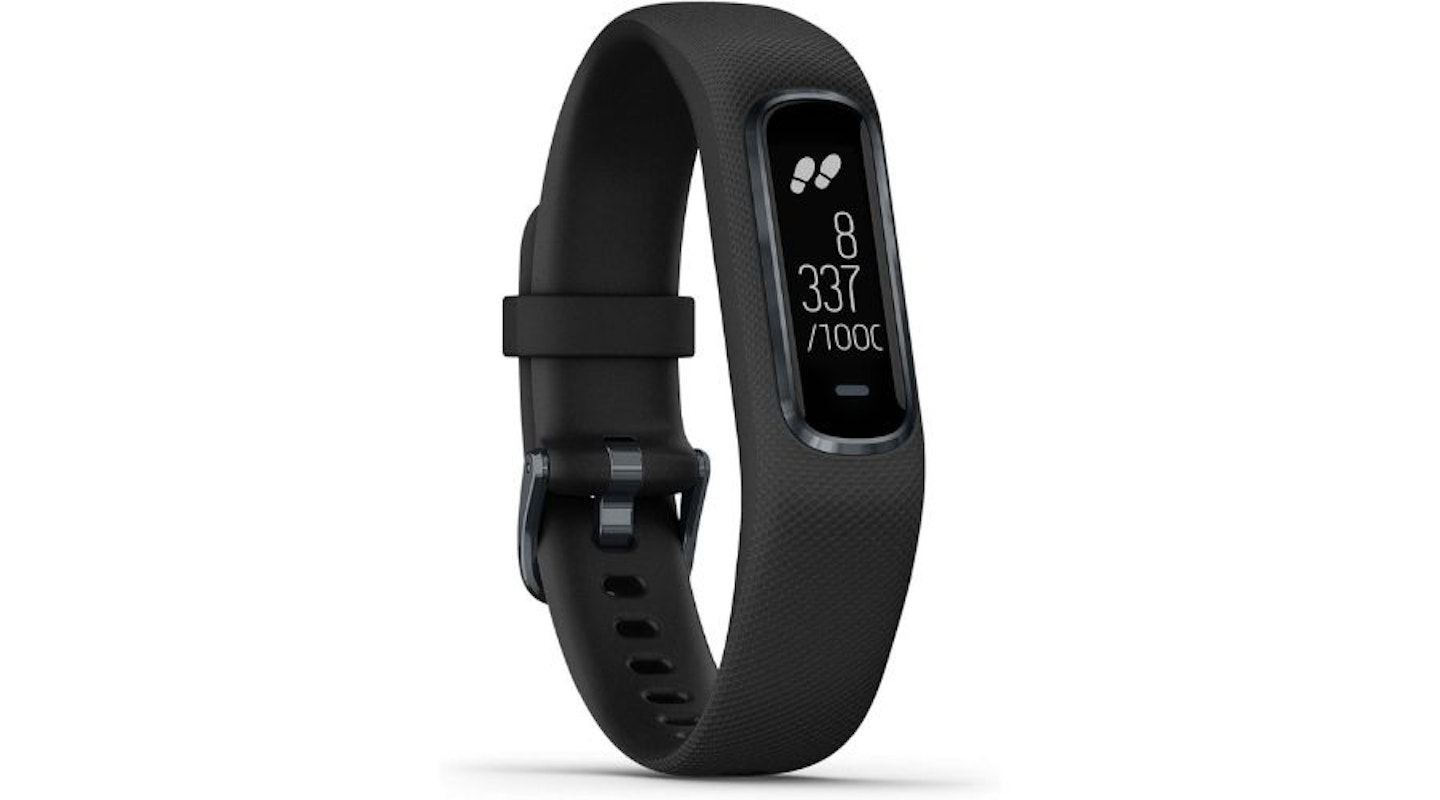 Amazon
AmazonThe Vivosmart 4 isn’t Garmin’s newest fitness tracker, having been replaced by the Vivosmart 5 in 2022. And in fact, the Vivosmart 4 has been around since 2018. But despite its age it remains one of the few Garmin devices that costs less than £100 (RRP £99.99, and often available for considerably less than this).
The compromise of an older device means a smaller screen, no built-in GPS, and slightly less accurate sensors. But you still get a very neat and comfortable fitness tracker which allows you access to Garmin’s considerable expertise, including metrics such as Body Battery. It also tracks heart rate, blood oxygen, sleep, stress, step count, and provides estimates of your VO2 Max and fitness age (which tells you how fit you are compared to your chronological age).
Battery life is a solid seven days, and the Garmin Connect app is one of the best companion apps in the business. It provides plenty of data that’s easy to understand and looks great. If you want a Garmin for under a hundred pounds, this is still a contender.
Pros
- Body Battery metric is exclusive to Garmin devices
- The Garmin Connect app is incredibly detailed and user-friendly
- Comfortable design
Cons
- It's several years old now, so misses a lot of features enjoyed by newer devices
| Display: | 6.6 mm x 17.7 mm |
| Sensors: | Garmin elevate heart rate monitor, Pulse ox blood oxygen saturation monitor, Barometric altimeter, Accelerometer, Ambient light sensor |
| Battery life: | Up to seven days |
| GPS: | Connected-GPS |
| Workouts tracked: | Seven sports modes |
| Weight: | 16.5 grams (small/medium) or 17.1 grams (large) |
| Dimensions: | 15 x 10.5 x 197 mm (small/medium) or 15 x 10.5 x 223 mm (large |
9.
Fitbit Ace 3
Best for kids
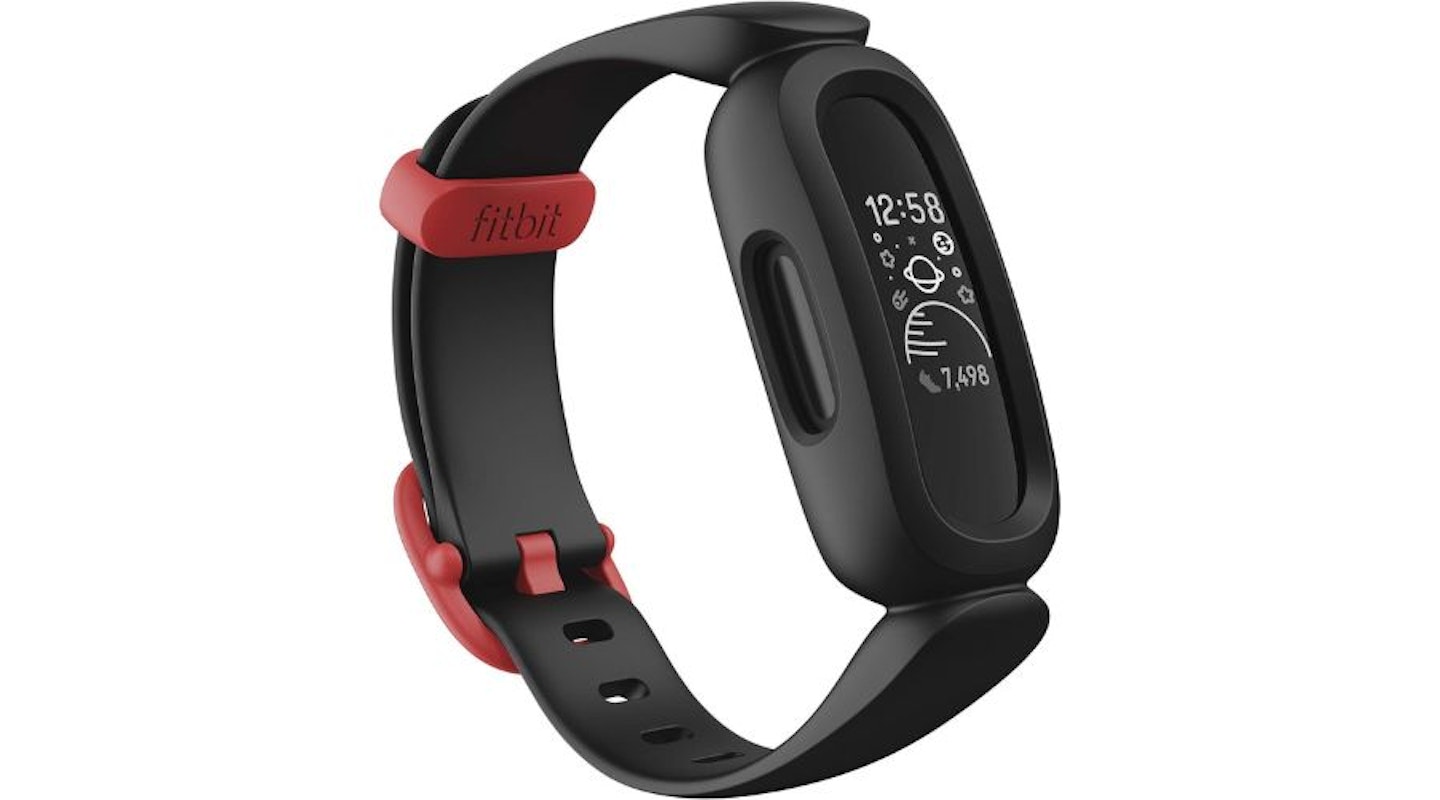 Fitbit
FitbitWhile it doesn’t have all the health and fitness features Fitbits for adults offer, the Fitbit Ace 3 still provides lots of the essentials to help keep track of health and wellbeing. The Ace 3 counts steps, tracks time spent being active, and sleep. It’s also water resistant to 50-metres. The device will remind kids to get moving, and offers badges, animated clock faces and avatars as rewards for being active.
Best of all, the companion app allows parents and children to keep track of their stats, without exposing children to potentially unwanted data such as calories burned. And while it’s suitable for kids from the age of six, its design means that it won’t start to look babyish as your child enters their teenage years, meaning that this should have some longevity.
Battery will last up to eight days, and the interchangeable silicon strap will help protect the screen from damage. If you’re looking for a basic fitness tracker to help encourage a child to get active, this has an RRP of £69.99, but is often available for less than £50.
Pros
- Durable, comfortable design
- Doesn't track calorie burn
- Design is suitable for younger and older children
Cons
- Limited fitness tracking features
- Black and white screen is dull
Buying guide: the best fitness trackers under £100
The variety of fitness trackers can make it difficult to know which one will be most suitable for your needs. Here are a few factors to consider:
Budget
While we've shortlisted fitness trackers that cost less than £100, there's still plenty of price ranges within that. Some fitness trackers will cost less than £50, while others might be almost double that (and that's without considering any more expensive devices). If you don't want to spend a lot, or if trying a fitness tracker for the first time, then a cheaper device that will let you dip your toe in the water might be more suitable.
Features
One factor that's influenced by your budget is the features available on your fitness tracker. For example, built-in GPS will tend to make a device more expensive compared to a tracker that relies on connected-GPS via your phone. So, if you tend to exercise exclusively at the gym, or at home, that's probably a feature you can live without.
At the same time, some devices will offer features that are exclusive to that brand – Garmin's Body Battery is a good example. It's worth taking time to explore whether those exclusive features matter to you, or not.
Finally, do you just want something that gives you a rough guide to how many steps you’ve taken each day? Or are you looking to monitor your heart, blood oxygen, and running cadence? Knowing what you want to focus on will help to identify the most appropriate fitness tracker for you.
Goals
The features you want will be influenced by the goals you've set yourself. For some, a basic device that counts steps will suffice, while for others, something that can help them set a new personal best on their next Parkrun may be required. In that example, a device with built-in GPS that can also deliver running metrics, will be more useful than a device that lacks those features.
Design
Budget fitness trackers are usually one of two styles: a lozenge, or a square smartwatch-type display. Lozenge devices tend to be smaller and lighter, while watch-style trackers are a bit bulkier and look more like a traditional timepiece. You may prefer one over the other due to your personal tastes or which you find more comfortable.
FAQ: the best fitness trackers under £100
What is the difference between a fitness tracker and a smartwatch?
The main difference between the great fitness trackers and the premium smartwatches lies primarily in their functions and features, although they do have a lot in common. Fitness trackers are designed first and foremost for health and activity monitoring. They are great for tracking steps, distance, heart rate and sleep patterns, and they're highly focused on providing precise fitness-related information.
Smartwatches, on the other hand, offer a more extensive range of features, because while they can also track fitness metrics, they go beyond that by acting as an extension of your phone. For example, smartwatches offer features like receiving notifications, making calls, sending messages, and even controlling smart home devices. They often have more advanced displays and are designed to help with a broader array of tasks, from productivity to entertainment.
Can a fitness tracker work without a phone?
Yes, a fitness tracker can work without a phone – to a certain extent. While almost all fitness trackers are designed to sync with a smartphone for a more well-rounded tracking experience, they can still function independently.
Most fitness trackers have built-in sensors for monitoring steps, distance, heart rate and sleep patterns, and they will store this data for a certain period of time (probably a few days). You can view your fitness metrics directly on the tracker itself, and some even offer basic on-device controls for activities like workouts or music playback.
Saying that, for more advanced features like GPS, receiving notifications and a deeper look into your fitness data, a connection to a phone is required. In short, while a fitness tracker can operate as a standalone device, its functionality is often enhanced when paired with a smartphone or iPhone. Indeed, there are a range of fitness trackers perfect for iPhones.
What are the benefits of the best fitness trackers under £100?
Fitness trackers offer a wide range of benefits for individuals looking to improve their overall health and wellness. These are just a few advantages of using a fitness tracker.
Activity monitoring: Fitness trackers can count your steps, track your distance and provide an overview of your daily physical activity. A fitness tracker will also often send you a notification when you haven't been active in a little while, which can come in super handy, particularly if you have a desk job or one that requires you sitting down for a while.
Heart rate monitoring: Many fitness trackers feature built-in heart rate monitors, allowing you to track your heart rate during exercise and generally throughout the day. This information can help you assess your cardiovascular health.
Calorie tracking: These clever little devices estimate the number of calories burned during exercise and daily activities, helping you manage your overall health, weight and nutrition.
Community engagement: Many fitness trackers have social features that allow you to connect with friends or participate in challenges and competitions, fostering a sense of community and friendly competition.
Improved accountability and motivation: Having a fitness tracker means being accountable to yourself, making it more likely that you'll stick to your fitness and health goals. It can also be motivating to see that you have almost hit your step goal, or exercise target, as well as being able to spot improvements in your fitness over time.
Goal setting: You can set specific fitness goals, such as steps per day, active minutes or weight loss targets, and with this, you can track your progress over time.
In essence, fitness trackers can serve as valuable tools for enhancing your physical and mental wellbeing, providing motivation and data-driven insights that can help lead to a healthier lifestyle.
Summary: the best fitness trackers under £100
Compared with the best fitness trackers under £50, increasing your budget to £100 means lots more devices become available to you. Many (though not all) of these will have more features, or better sensors than their cheaper counterparts. And it’s worth pointing out that many of the best fitness trackers – we're thinking of the Fitbit Charge 6 and the Garmin Vivosmart 5 as a couple of examples – will still generally cost more than £100 (although you may sometimes find them available at a discount).
That being said, a fitness tracker under £100 will generally give you lots of health and fitness tracking tools, to help keep you on track for hitting your health and fitness goals. Built-in GPS is still relatively rare, so you may need to use your phone to track your outdoor runs and bike rides (depending on which device you choose). But if you want the basics, such as heart rate, sleep, blood oxygen and stress monitoring, these fitness trackers will provide all that - and plenty more – in a sleek and stylish package. We've plumped for the Fitbit Inspire 3 as our top pick in this price range, as it offers a plenty of features and is very user-friendly. But if built-in GPS is a must-have for you, then the Xiaomi Smart Band 8 Pro or Huawei Watch Fit SE are both great options.
How we chose:
When choosing the best fitness trackers under £100, we looked for devices from brands that have a strong reputation in the fitness tracker space – no mystery brands that we’ve never heard of before. We ruled out any devices that cost more than £100 - so some great fitness trackers like the Fitbit Charge 5 (RRP £129.99) were ruled out.
Once we’d identified devices within this price range, we considered design, features, performance, and value for money. Do they look good? What materials are they made from? What features do they have? Is anything missing, or is there something extra they offer which we wouldn’t normally expect at this price point? How good is the battery life? And what is the supporting app like? Once we'd considered all these factors, we were able to put together our guide to the best fitness trackers under £100.
Steven Shaw is a Senior Tech Writer. Steven writes how-to guides, explainers, reviews and best-of listicles covering a wide range of topics. He has several years of experience writing about fitness tech, mobile phones, and gaming.
When Steven isn’t writing, he’s probably testing a new smartwatch or fitness tracker, putting it through its paces with a variety of strength training, HIIT, or yoga. He also loves putting on a podcast and going for a long walk.
Subscribe to the What’s The Best Newsletterto keep up to date with more of the latest reviews and recommendations from the What’s The Best team.
